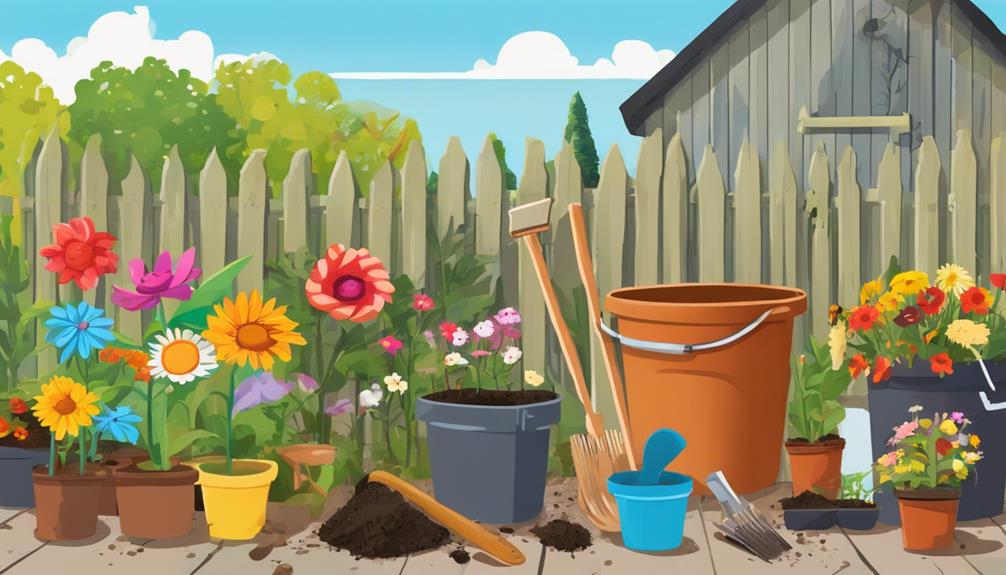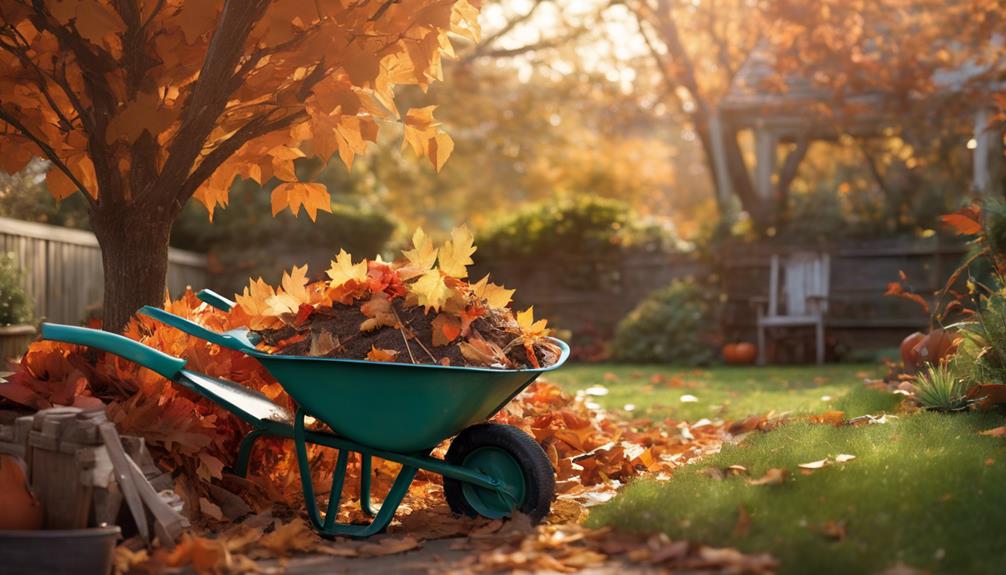
Tips for Urban Garden Seasonal Cleanup
7 February 2025
What Are Your Options for Fencing and Landscaping?
7 February 2025Spring cleanup is an ideal time to adopt eco-friendly gardening solutions that promote healthy plants and a sustainable environment.
Begin with proper soil management by testing nutrient levels and incorporating organic matter such as compost to improve fertility and structure.
Utilise natural fertilisers and mulching techniques to suppress weeds while retaining moisture.
For pest control, consider neem oil and beneficial insect attractants, which support a balanced ecosystem.
Implementing these practices not only enhances plant health but also minimises chemical usage.
Explore more creative techniques and tips to cultivate a thriving garden that aligns with eco-friendly principles.
Spring Gardening Essentials Explained
As spring approaches, equipping yourself with the right gardening tools is vital for effective planting and maintenance.
Furthermore, understanding the importance of soil health can greatly enhance your garden's productivity and sustainability.
This discussion will outline essential tools and highlight practices that promote ideal soil conditions for environmentally friendly gardening.
Essential Tools Overview
A gardener's toolkit is essential for achieving a successful spring planting season. Important tools include a high-quality spade for effective soil turning, a trowel for precise planting, and a hoe for weed management.
Pruning shears are indispensable for maintaining plant health, while a sturdy rake helps prepare garden beds by removing debris and levelling soil. A watering can or hose with a spray nozzle ensures efficient irrigation, preventing water waste.
In addition, utilising biodegradable garden bags for waste disposal supports eco-friendly practices. Consider investing in ergonomic tools to minimise strain during extended use.
Soil Health Importance
Maintaining healthy soil is fundamental to achieving a thriving garden, as it serves as the foundation for plant growth and nutrient absorption.
Soil health encompasses a complex ecosystem of microorganisms, organic matter, and minerals that work synergistically to support flora. Nutrient-rich soil improves plant resilience, enabling them to withstand pests and diseases while optimising water retention.
Incorporating organic amendments, such as compost or well-rotted manure, can dramatically improve soil structure and fertility. Furthermore, practising crop rotation and cover cropping further enriches soil biodiversity and nutrient availability.
Regular soil testing is crucial to identify deficiencies and adjust management practices accordingly.
Ultimately, prioritising soil health is not merely beneficial; it is vital for sustainable gardening and achieving long-term ecological balance.
Soil Health and Quality
Soil health and quality are fundamental to successful eco-friendly gardening, necessitating attention to various key practices.
Incorporating organic matter, enhancing microbial diversity, and balancing soil pH are crucial techniques that contribute to a thriving garden ecosystem.
Organic Matter Incorporation
Healthy gardens thrive on rich, fertile soil, which can be significantly enhanced through the incorporation of organic matter. By adding organic materials such as compost, well-rotted manure, or leaf mould, gardeners can markedly improve soil structure, moisture retention, and nutrient availability.
- Nutrient Enrichment: Organic matter supplies essential nutrients, promoting vigorous plant growth.
- Soil Aeration: It enhances the soil's texture, facilitating root penetration and water movement.
- Water Retention: Improving the soil's capacity to retain moisture reduces the necessity for frequent irrigation.
Prioritising organic matter incorporation not only nurtures a flourishing ecosystem but also results in healthier plants.
Mastery of this practice ensures long-term soil health, enabling sustainable gardening and increased crop yields.
Microbial Diversity Enhancement
A thriving garden ecosystem relies heavily on the intricate web of microbial life within the soil.
Microbial diversity is fundamental for enhancing soil health, boosting nutrient cycling, and fostering plant resilience. By cultivating a rich spectrum of microorganisms, gardeners can create a dynamic environment that supports robust plant growth and sustainability.
- Mycorrhizal fungi: Improve nutrient uptake and enhance drought resistance.
- Nitrogen-fixing bacteria: Convert atmospheric nitrogen into a usable form, promoting plant vigour.
- Decomposers: Break down organic matter, enriching the soil with crucial nutrients.
To promote microbial diversity, consider practices such as cover cropping, crop rotation, and minimising soil disturbance.
Embracing these strategies not only nurtures the soil but also ensures a flourishing garden for seasons to come.
Soil Ph Balancing Techniques
Maintaining ideal pH levels in garden soil is crucial for ensuring nutrient availability and overall plant health. Proper pH not only improves nutrient uptake but also fosters beneficial microbial activity.
Here are effective techniques for balancing soil pH:
- Amend with Organic Matter: Incorporate compost or well-rotted manure to naturally adjust pH and enhance soil structure.
- Utilise Sulphur or Lime: Apply elemental sulphur to lower pH or agricultural lime to raise pH, based on soil test results.
- Monitor Regularly: Conduct soil tests to track pH changes and make informed adjustments.
Soil Testing Procedures
Soil testing is a critical initial step in understanding the health and quality of your garden's soil.
By gathering soil samples correctly, gardeners can identify nutrient deficiencies and make informed decisions about mulch application techniques and companion planting strategies.
These practices not only improve soil quality but also promote sustainable gardening methods.
Gather Soil Samples
Understanding the intricate balance of nutrients within your garden's ecosystem is essential for fostering healthy plant growth. Gathering soil samples is a fundamental step in evaluating soil health and determining necessary amendments.
Follow these guidelines to ensure effective sampling:
- Choose multiple locations: Sample from different spots in your garden to capture the complete soil profile.
- Use clean tools: A trowel or soil probe should be sanitised to avoid contamination.
- Collect at the right depth: Aim for a depth of 15-20 centimetres to reach the root zone.
After collecting your samples, mix them thoroughly and send them to a reputable laboratory for analysis.
This practice provides invaluable insights into nutrient deficiencies and pH levels, empowering you to make informed decisions for a thriving garden.
Mulch Application Techniques
After evaluating the health of your soil through thorough testing, the next step in enhancing your garden's ecosystem involves the strategic application of mulch.
Properly applied mulch not only conserves moisture but also fosters soil health and suppresses weeds.
To master mulch application, consider the following techniques:
- Layer Thickness: Aim for a mulch layer of 5-10 centimetres to enhance benefits without suffocating plant roots.
- Material Selection: Choose organic mulches such as wood chips or straw, which decompose and enrich the soil over time.
- Application Timing: Apply mulch in early spring or autumn to improve moisture retention and weed suppression as the growing season begins.
Companion Planting Strategies
Companion planting offers a strategic approach to enhancing garden productivity and pest management by utilising the natural relationships between different plant species.
This technique can significantly improve soil health and crop yields while minimising the need for chemical interventions.
Consider the following benefits of companion planting:
- Pest Deterrence: Certain plants repel harmful insects, thereby reducing the necessity for pesticides.
- Nutrient Improvement: Some plants, such as legumes, enrich the soil with nitrogen when grown alongside others.
- Space Optimisation: Companion plants can make better use of space by complementing each other's growth habits.
To effectively implement these strategies, conduct soil testing to assess nutrient levels and pH.
Understanding your soil composition allows for informed decisions regarding which plant combinations will thrive in your unique garden environment.
Enhanced Plant Growth Potential
While many gardeners seek to cultivate thriving plants, the potential for improved growth lies in the careful selection of eco-friendly practices and materials. Utilising organic compost, mulching techniques, and natural fertilisers not only enriches the soil but also fosters a sustainable ecosystem. The following table outlines effective strategies for boosting plant growth:
| Practice | Benefits | Implementation Tips |
|---|---|---|
| Organic Compost | Improves soil structure | Mix with existing soil |
| Mulching | Retains moisture, suppresses weeds | Use organic materials like straw |
| Natural Fertilisers | Provides crucial nutrients | Apply during active growth |
| Crop Rotation | Prevents nutrient depletion | Rotate plant families yearly |
| Cover Crops | Improves soil health | Plant during off-seasons |
Adopting these eco-friendly solutions can greatly enhance the vitality and resilience of your garden.
Sustainable Pest Management Techniques
Sustainable pest management techniques are crucial for maintaining a healthy garden ecosystem while minimising chemical interventions.
Key strategies include the application of neem oil, the use of beneficial insect attractant sprays, and insecticidal soap, each offering natural solutions to common pest problems.
These methods not only protect plants but also support biodiversity in the garden.
Neem Oil Treatment
How can gardeners effectively manage pests without harming the environment? Neem oil, derived from the seeds of the neem tree, offers a sustainable alternative for pest control. Its multifaceted properties make it a valuable tool in eco-friendly gardening practices.
- Kills a broad spectrum of pests, including aphids and spider mites.
- Disrupts insect life cycles, reducing future infestations.
- Non-toxic to beneficial insects when used correctly.
When applied as a foliar spray, neem oil penetrates plant tissues and inhibits pests while being gentle on the ecosystem.
To enhance efficacy, it is essential to apply neem oil during cooler hours and ensure thorough coverage. This method not only protects your garden but also promotes a healthier environment.
Beneficial Insect Attractant Sprays
Attracting beneficial insects is a significant strategy in sustainable pest management, as these natural allies play a vital role in controlling pest populations.
Utilising beneficial insect attractant sprays can effectively enhance your garden's ecosystem. These sprays are designed to draw in predators and parasitoids, which naturally suppress pest numbers without harmful chemicals.
Key benefits include:
- Enhanced Biodiversity: Increases the variety of insects, promoting a balanced ecosystem.
- Reduced Chemical Dependence: Minimises the need for synthetic pesticides, fostering a healthier environment.
- Improved Pollination: Attracts pollinators such as bees, which are essential for plant reproduction.
Insecticidal Soap Usage
Insecticidal soap is a highly effective tool for managing pest populations in an eco-friendly manner. This natural solution targets soft-bodied insects such as aphids, spider mites, and whiteflies by disrupting their cellular membranes, leading to dehydration and death.
Key benefits of insecticidal soap include:
- Non-Toxic: Safe for use around pets, children, and beneficial insects when applied correctly.
- Biodegradable: Breaks down quickly in the environment, minimising ecological impact.
- Ease of Application: Can be sprayed directly on affected plants, providing immediate results.
For peak effectiveness, apply during the cooler parts of the day and ensure thorough coverage of infested areas.
With its efficacy and sustainability, insecticidal soap is an indispensable component of integrated pest management.
Weeds and Their Management
Effective weed management is crucial for maintaining a thriving garden ecosystem.
Techniques such as mulching, compost tea application, and the use of natural fertilisers can greatly reduce weed proliferation while promoting soil health.
Mulching for Weed Suppression
Utilising mulch as a protective layer over garden soil serves as a highly effective strategy for suppressing weed growth. By creating a barrier that blocks sunlight, mulch inhibits the germination of weed seeds while simultaneously enhancing soil moisture retention and temperature regulation.
Consider the following benefits of mulching:
- Weed Suppression: Reduces competition for nutrients and water by limiting the growth of unwanted plants.
- Soil Health: Organic mulches decompose over time, enriching the soil with essential nutrients.
- Erosion Control: Stabilises soil structure, preventing erosion and runoff during heavy rainfall.
Incorporating mulching into your gardening practices not only fosters a healthier ecosystem but also minimises the need for chemical herbicides, aligning with eco-friendly gardening principles.
Compost Tea Application Method
Compost tea serves as a powerful tool in the management of weeds, complementing the protective benefits of mulching. This nutrient-rich liquid extract fosters a robust soil ecosystem, enhancing plant health and resilience.
When applied correctly, compost tea can outcompete weeds for crucial resources, thereby mitigating their growth.
- Microbial Activity: Promotes beneficial microorganisms that suppress weed germination.
- Nutrient Availability: Enriches soil with nutrients that support desired plants over invasive species.
- Soil Structure: Improves aeration and water retention, creating unfavourable conditions for weeds.
To apply compost tea effectively, utilise a foliar spray or soil drench method, ensuring even coverage around the root zone of your plants.
Regular applications can lead to long-term weed management success and a thriving garden.
Natural Fertilizer Alternatives
Natural fertilisers play a crucial role in promoting healthy plant growth while simultaneously managing weed populations. By utilising organic amendments, gardeners can improve soil fertility and create a competitive environment that inhibits weed establishment.
The following natural fertiliser alternatives provide effective solutions:
- Compost: Rich in nutrients, it enhances soil structure and fertility while suppressing weed seed germination.
- Manure: A balanced source of nutrients that also boosts microbial activity, contributing to robust plant health and reduced weed competition.
- Mulch: Organic mulches not only retain soil moisture and reduce erosion but also impede weed growth through light suppression.
Incorporating these alternatives into your gardening practices can lead to a thriving ecosystem, fostering plant health and minimising the need for synthetic herbicides.
Why Choose TKL Birmingham Gardener
When it comes to selecting a gardening service, many homeowners seek a provider that not only understands their vision but also prioritises sustainable practices.
TKL Birmingham Gardener excels in this regard, offering expertise in eco-friendly gardening solutions tailored to individual landscapes. Their commitment to sustainable horticulture is reflected in their use of organic materials, water conservation techniques, and integrated pest management strategies.
TKL's skilled team is adept at creating flourishing gardens that enhance biodiversity while minimising environmental impact.
Furthermore, they provide extensive consultations, ensuring that each project aligns with the client's goals.
Common Gardening Questions Answered
Gardening can often raise a myriad of questions for both novice and experienced gardeners alike. A common inquiry pertains to soil quality; ensuring optimal drainage and nutrient content is vital for plant health.
Furthermore, the choice between organic fertilisers and chemical alternatives often sparks debate. Organic options promote soil biodiversity, while synthetic fertilisers may deliver immediate results.
Watering practices also generate questions—understanding the balance between overwatering and underwatering is critical for plant vitality.
Pest management is another frequent concern; implementing integrated pest management strategies can mitigate infestations while minimising environmental impact.
Plan Seasonal Planting Schedule
A well-structured seasonal planting schedule is essential for maximising the potential of your garden and ensuring ideal growth for your plants.
By understanding the timing of planting, you can improve yields and optimise resource use.
To create an effective schedule, consider the following key factors:
- Climate Zones: Identify your local climate zone to determine suitable planting times.
- Plant Compatibility: Group plants with similar water, light, and nutrient needs to promote healthy growth.
- Crop Rotation: Implement a rotation strategy to prevent soil depletion and pest build-up.




